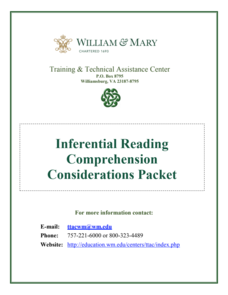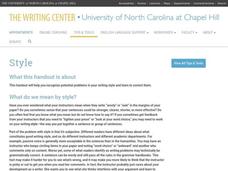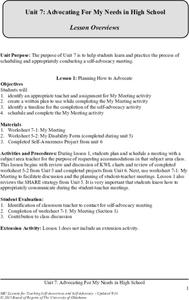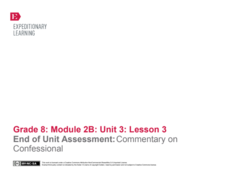Missouri Department of Elementary
To Give In or Not to Give In—That Is the Question!
No! A very simple word that can be very hard to say. Seventh graders have an opportunity to practice this difficult skill as they engage in a series of role-playing scenarios. As an exit ticket, 7th graders write a reflection on the...
Houghton Mifflin Harcourt
Give It All You’ve Got!: English Language Development Lessons (Theme 2)
Go beyond the textbook to gain a better appreciation for the English language. A series of ESL lessons help expand the concepts found in Theme 2: Give It All You've Got. The second lesson in a three-part unit incorporates strategies such...
William & Mary
Inferential Reading Comprehension Considerations Packet
Don't forget to read between the lines! Educators learn tips and activities to help scholars learn to infer to increase reading comprehension. Activities suggested include think alouds, backwards words, and who's who. the packet includes...
National Council of Teachers of English
Writing Poetry with Rebus and Rhyme
Young scholars write rhyming poems using rebus. With pictures instead of words, authors create original work about things they love.
Charleston School District
Review Unit 5: Equations
It's time for them to show you what they've learned! The review provides a sampling of the different concepts learned throughout the eight-part series. Learners solve equations by combining like terms, applying the distributive property,...
University of North Carolina
Style
Just like you choose your clothes to ensure they fit the occasion, you should choose your words deliberately while writing. Style, the main topic of one handout in a series on writing skills, involves choosing words carefully and paying...
K12 Reader
Using Prior Knowledge
Sometimes it's hard to relate to a new text. Teach kids to use their prior knowledge when reading something new with a comprehension exercise. A short passage tells them how to think of their brains like filing systems, and provides five...
EngageNY
Narratives as Theater, Part I: What is Readers Theater?
Discover the exciting world of readers theater! Scholars learn all about the reading strategy, reading a script about American heroes and completing an I Notice/I Wonder chart. Next, pupils participate in readers theater using the...
Fluence Learning
Construct Viable Arguments About Adding Fractions
Test mathematicians' knowledge of adding fractions with a brief assessment that challenges them to play teacher while correcting a peer's work. Scholars examine Carl's mathematical response, identify where he went wrong,...
Curated OER
Finding Solutions by Working Backwards
In this math activity, students learn to solve word problems by working backwards. Students read the 20 word problems and solve them, choosing the best answer from 4 choices. There are helpful hints on the page to clue students to work...
University of Oklahoma
Advocating For My Needs in High School
High schoolers enrolled in resource and special needs classes learn and practice how to schedule and conduct a self-advocacy meeting with a teacher to request accommodations in that subject area class. In lesson one they review and...
Curated OER
Hot Chocolate Problems
Kids love real word math becuase it connects to their everyday life and is really useful to learn. They are given the recipe for hot chocolate, using that recipe they must alter the quantities of each ingredient in order to accommodate a...
K12 Reader
Why Does the Moon Orbit Earth?
Have you ever looked up at the moon and wondered why it looks different every night? Learn about the moon's orbit and the lunar cycle with a reading comprehension exercise. Using context clues, kids find the definitions of unfamiliar...
Northern Lights Special Education Cooperative
Lessons from The 7 Habits of Highly Effective Teens
As part of a study of Sean Covey, the author of The 7 Habits of Highly Effective Teens learners write autobiographical e-mails, hold discussions, create a collage, and compose a personal mission statement. Pupils then have a...
Farmington Public Schools
British Literature Honors: Beowulf
Whether new to teaching Beowulf or an experience pro, you'll find much to like in a richly detailed unit plan that asks readers to consider how the epic represents the difficulty in defining good and evil but also reflects the changing...
K12 Reader
Kinds of Angles
Have you ever wondered how circles and angles relate to each other? Read a passage about right angles, acute angles, and obtuse angles, and answer reading comprehension questions about the information you learn.
K12 Reader
Galileo and His Telescope
Learn about Galileo Galilei's contribution to modern science with a reading passage that focuses on reading comprehension. After kids read several paragraphs about his life, they answer five questions about the information they have just...
K12 Reader
National Symbols
What are the most prominent symbols of the United States? Learn about the bald eagle, the American flag, and the Statue of Liberty in a reading comprehension activity that includes a short passage and five reflective questions.
E Reading Worksheets
Making Predictions #1
How can you tell what is going to happen next in a story? Learn to make predictions with five sections of stories. Kids read the beginning, and then write what they believe will happen next. Additionally, they provide evidence for their...
EngageNY
Grade 10 ELA Module 1: Unit 3, Lesson 3
Few studies have captured the complex relationships between mothers and daughters, such as Amy Tan's The Joy Luck Club. Tenth graders read "Rules of the Game," which describes Waverly's youth in chess tournaments, and compare how she...
IB Psychology
Key Terms Traffic Lights
How much does your class know about psychology? What about empirical evidence? If they could use some time to learn the essentials of psychology, use a quick reference sheet to note what they know before the test, after the unit, and at...
EngageNY
Mid-Unit Assessment: Analyzing an Informational Text about a Refugee Experience
Refugee & Immigrant Transitions is an organization that helps newcomers adjust to life in the United States through education and community leadership opportunities. As part of a mid-unit assessment, pupils independently read a...
EngageNY
End of Unit Assessment: Commentary on Confessional
What does commentary have to do with narrative? Before scholars explain the narrative choices in their Character Confessionals, they review provided commentary to explain the score they received on previous assessments. They review...
EngageNY
Studying Conflicting Interpretations: Perspectives on Plessy v. Ferguson: Part 2
The Plessy v. Ferguson case was influential in establishing segregation in the United States. Scholars continue reading the court's decision in the case, seeking to understand the key reasons the court came to its decision. Pupils also...

























